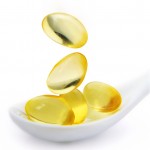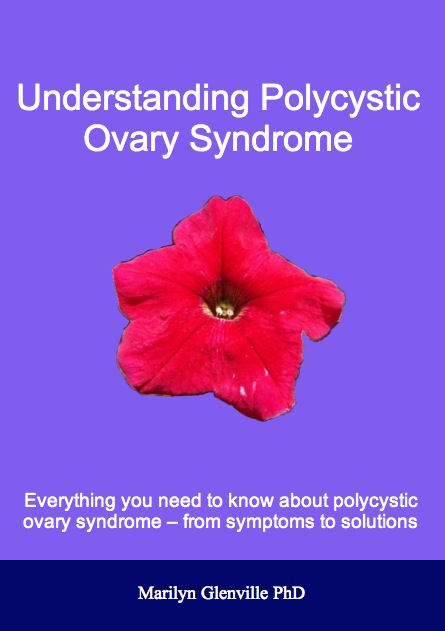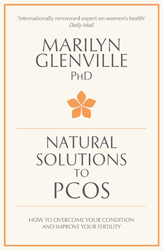Polycystic Ovary Syndrome (PCOS)

What is polycystic ovary syndrome?
In each menstrual cycle, follicles grow on the ovaries. Within those follicles eggs develop, one of which will reach maturity faster than the others and be released into the fallopian tubes. This is known as ovulation. The remaining follicles (sometimes hundreds) will degenerate. In the case of polycystic ovaries, however, the ovaries are much larger than normal, and there are a series of undeveloped follicles that appear in clumps, rather like a bunch of grapes. Polycystic ovaries are not particularly troublesome and in many cases they will not even affect your fertility. Where the problem starts, however, is when the cysts cause a hormonal imbalance, leading to a series of other symptoms. These symptoms are the difference between suffering from PCOS and from polycystic ovaries.
So a woman can have polycystic ovaries without having PCOS but all women with PCOS will have polycystic ovaries.
What symptoms could you experience?
With the most extreme form of PCOS, you would tend to be overweight, have no or very few periods, be prone to acne, grow unusually heavy body hair, often on the face, breasts and inside of the legs, and be susceptible to mood swings. And with this can come problems with fertility and often recurrent miscarriages. Women with PCOS may be seven times more likely to develop diabetes because of problems with blood sugar balance.
What are your choices?

Over the last few years, research into the nutritional approach to PCOS has revolutionised the treatment of this problem.As women with PCOS lose weight, hormone levels start to return to normal. Testosterone levels fall, serum insulin levels go down, SHBG levels go up and the symptoms of PCOS diminish, with significant improvements in the growth of excess hair as the women lose weight.
Along with the weight loss comes a remarkable change in ovarian function. In one study, 82 percent of the women who were not previously ovulating showed improvements, with a number of successful pregnancies during the study, even though many of these women had a long-standing history of infertility.
So dramatic have been some of the results, that it has now been suggested that changing a woman’s diet should be the first move if she is overweight and failing to conceive. One study found that 11 out of 12 women who had been overweight and not ovulating conceived naturally after reducing their weight.
In general, women with high levels of luteinising hormone (LH) in the first half of their menstrual cycle seem to have a greater risk of miscarriage. So miscarriages are more likely to occur in women with PCOS because of the high levels of LH. But, in a study of women with PCOS who were asked to change their diets, the rate of miscarriages dropped from 75 percent to 18 percent once they had lost weight.
Supplements

If you been using the Pill to regulate your periods, you may have an even greater imbalance between a number of key vitamins and minerals. Correcting this imbalance will go a long way towards treating the root cause of the problem.
Multivitamin and Mineral
A good quality multivitamin and mineral would form the foundation of your supplement programme to make sure that you are getting a ‘little bit of everything’. You then add in those nutrients in slightly higher amounts which are known to be helpful for PCOS.
Chromium
Chromium is an extremely important mineral if you have PCOS. It helps to encourage the formation of glucose tolerance factor (GTF) which is a substance released by the liver and required to make insulin more efficient. A deficiency of chromium can lead to insulin resistance, which is a key problem in the case of PCOS; too much insulin can be circulating but it is unable to control your blood sugar (glucose) levels.
Chromium is the most widely researched mineral used in the treatment of overweight. It helps to control cravings and reduces hunger. Chromium also helps to control fat and cholesterol in the blood. One study showed that people who took chromium over a ten-week period lost an average of 1.9kg (4.2lb) of fat while those on a placebo (sugar tablet) lost only 0.2kg (0.4lb)
Warning
If you are diabetic and on medication, you should speak to your doctor before taking chromium
B vitamins
The B vitamins are very important in helping to correct the symptoms of PCOS. Vitamins B2, B3, B5 and B6 are particularly useful for controlling weight, and here’s why: Vitamin B2 helps to turn fat, sugar and protein into energy. B3 is a component of the glucose tolerance factor (GTF), which is released every time blood sugar rises, and vitamin B3 helps to keep the levels in balance. Vitamin B5 has been shown to help with weight loss because it helps to control fat metabolism. B6 is also important for maintaining hormone balance and, together with B2 and B3, is necessary for normal thyroid hormone production. Any deficiencies in these vitamins can affect thyroid function and consequently affect the metabolism.
The B vitamins are also essential for the liver to convert your ‘old’ hormones into harmless substances which can then be excreted from the body.
Zinc
Zinc is one of the key minerals that we need in our daily diets and it has a wide range of functions. Unfortunately, because our soil has been depleted by overfarming, there is very little natural zinc found in our food. Furthermore, processing and refining strip out what little might be remaining. So no matter how good your diet, you may not be getting anywhere near the levels of zinc that you need. There are two approaches to this: you can eat whole organic food, which has much more rigorous controls on farming methods, or you can add a zinc supplement to your diet. But why is it so important?
Zinc is an important mineral for appetite control and a deficiency can cause a loss of taste and smell, creating a need for stronger-tasting foods, including those that are saltier, sugarier and/or spicier (in other words, often more fattening!). Zinc is also necessary for the correct action of many hormones, including insulin, so it is extremely important in balancing blood sugar. It also functions together with vitamins A and E in the manufacture of thyroid hormone.
Magnesium
Magnesium levels have been found to be low in people with diabetes and there is a strong link between magnesium deficiency and insulin resistance. It is, therefore, an important mineral to include if you are suffering from PCOS.
Co-Enzyme Q10
Co-Q10 is a substance that your body produces in nearly every cell. It is important for breaking down carbohydrates and turning them into energy instead of being stored as fat. It also helps to balance your blood sugar.
Vitamin D
Vitamin D, the sunshine vitamin, is now recognised as being so important in controlling blood sugar and improving insulin sensitivity. We also know that having low levels of vitamin D is associated with insulin resistance and obesity in women with PCOS.
Omega 3 fatty acids
These essential fatty acids help your body become more sensitive to insulin and taken in supplement form have been found to reduce testosterone levels in women with PCOS and the greatest reduction is seen in those women who had high levels of Omega 6 fatty acids compared to Omega 3. That is why it is so important to get the correct balance of Omega 3 to Omega 6.
Probiotics
Beneficial bacteria, also known as probiotics, are important as they play a part In PCOS as they can help to control your weight. We know that there is a difference between the composition of the gut flora in normal weight and obese people.
Poor levels of beneficial bacteria can make your body store more calories and can actually make you become overweight by increasing your appetite and make you more insulin resistant.
We also know that probiotics can help reduce weight around the middle of the body (more common in PCOS weight gain.
Amino Acids
Amino acids are the building blocks of the protein that you eat. Certain amino acids can be very helpful for PCOS as they can improve your insulin sensitivity and also can have an effect on weight loss e.g. n-acetyl cysteine, carnitine, tyrosine, arginine, glutamine, isoleucine, leucine and valine.
Furthermore, by adopting a healthier lifestyle you will be more likely to prevent Polycystic Ovary Syndrome (PCOS) which is discussed in detail in the rest of this ebook which you can read by clicking on Understanding Polycystic Ovary Syndrome (PCOS) ebook at The Natural Health Practice
Herbs

Herbs are extremely useful in the treatment of PCOS. Making changes and adding supplements to your diet will help to control weight and balance blood sugar, while herbs go a step further, targeting any problems involving hormone balance.
Herbs can also be very beneficial in encouraging the function of your liver, in order to make sure that it is metabolising the hormones efficiently and then eliminating them.
Agnus castus (Vitex/chastetree berry)
This is one of the most important herbs for PCOS because it helps to stimulate and normalise the function of the pituitary gland, which controls the release of LH (luteinising hormone).
Black cohosh (Cimicifuga racemosa)
This herb is so important for PCOS as it helps to reduce the hormone LH which is often too high. It is also beneficial for reducing anxiety and tension.
Milk Thistle (Silybum marianum)
This is one of the key herbs for the liver, which acts as your waste disposal unit,, and it is therefore essential for the treatment of PCOS. It helps to protect your liver cells against damage and to promote the healing of damaged cells, so improving the general functioning of the liver and all its detoxifying properties.
Saw Palmetto (Serenoa repens)
Saw palmetto is a herb that is traditionally considered in light of its success in treating prostate problems caused by an imbalance of hormones (including excess testosterone). It is a small palm tree found in North America and the berries of the tree are used in tinctures or capsule form.
Research has shown that saw palmetto works as an anti-androgen, which can be very helpful given the high levels of testosterone in PCOS.
I would suggest that you add saw palmetto to your treatment plan if you have excess hair growth, or have been told you have high levels of androgens. Otherwise, just take the agnus castus, black cohosh and milk thistle.
Caution
You should not take any of the above herbs if you are taking, The Pill, Fertility drugs, HRT or any other hormonal treatment or other medication unless they are recommended by a registered, experienced practitioner.
Tests

Mineral Deficiency Test with Supplement Programme (hair)
Find out what the mineral and heavy toxic levels are in your body
This test measures the deficiencies and excess levels of 12 different minerals (including calcium, chromium, cobalt, copper, iron, magnesium, manganese, phosphorus, potassium, selenium, sodium and zinc) and 6 heavy toxic metals (including aluminium, arsenic, cadmium, lead, mercury and nickel) that may be present in your body. Find out more – Mineral Deficiency Test with Supplement Programme (hair)
Online Personalised Supplement Assessment Programme
Discover what vitamins and minerals you need and should be taking
The analysis of this comprehensive questionnaire will give you a three monthly supplement programme to help balance any vitamin and mineral deficiencies you may have. Find out more – Online Personalised Supplement Assessment Programme
Vitamin D Deficiency Test (at home finger prick blood)
With all the news in the press about the benefits of having good levels of vitamin D e.g. prevention of cancer, especially breast cancer, heart disease, Type 2 diabetes and osteoporosis it is important that you know whether or not you are lacking in this vital vitamin.
We know that Vitamin D is required for calcium absorption, but it also plays many other important roles including prevention of cancer, especially breast cancer, heart disease, Type 2 diabetes and osteoporosis. As well as all of these benefits, it is now thought that having good levels of vitamin D can help slow down the ageing process and low levels have been implicated in other autoimmune diseases such as rheumatoid arthritis, lupus and inflammatory bowel disease. To check whether you have sufficient levels of Vitamin D please click Vitamin D Deficiency Test (at home finger prick blood)
Omega 3 Deficiency Test (at home finger prick blood)
If you want to find out if you are getting enough Omega 3 fatty acids from your diet and whether you have the correct balance of essential fatty acids.
Signs of an Omega 3 fatty acid are dry skin, lifeless hair, cracked nails, fatigue, depression, dry eyes, lack of motivation, aching joints, difficulty in losing weight, forgetfulness, breast pain. If you have also tried to lose weight by going on a low-fat or no-fat diet, you are likely to be deficient in these essential fats. It is now estimated that we are getting ten times more Omega 6 fats from our diet than Omega 3 and over the last century there has been an 80% decrease in the consumption of these Omega 3 fatty acids. When you eat Omega 3 fats they are converted to substances that have an anti-inflammatory effect on the body.
Many of the women I see in the clinic have been taking evening primrose oil supplements – an Omega 6 fatty acid – for many years as it can be helpful with PMS. But you can end up with too much Omega 6 and not enough Omega 3 in your body. Some women are also taking combinations such as Omega 3, 6, and 9 in supplement form because they have heard that we need a good balance of all the Omega fatty acids. This is true, but you have to take into account what your own levels may be in the first place. It is no good adding in more Omega 6 if you have already got enough or in fact too much in your body. (You can now have a blood test to tell you if you have the correct levels of Omega 3 to Omega 6 in your body see below). To check whether you have sufficient levels of Omega 3 please click Omega 3 Deficiency Test (at home finger prick blood)
After three months you would then have a re-test in order to monitor your progress and adjust your supplement programme according to your new condition.
If you need help in obtaining any of the supplements, herbs or tests mentioned above, click, Polycystic Ovary Syndrome (PCOS) options at The Natural Health Practice. They can supply all of them for you online or if you prefer to talk to somebody first you can also order by mail order on the telephone. The products supplied by this company are always of the highest quality.
Plan of Action
Nutrition
Ensure you are getting the right nutrition.Follow the dietary recommendations outlined in the free The Foundation of Health ebook For more information on the special dietary recommendations for Polycystic Ovary Syndrome (PCOS), read the rest of the ebook on Understanding Polycystic Ovary Syndrome (PCOS) ebook at The Natural Health Practice
Supplements
The supplement programme below should be taken for at least three months in order to achieve best results
Nutrients & amounts
| A good multi-vitamin & mineral supplement | B Vitamins | 50mg | |
| Chromium | 300µg | Vitamin C with bioflavonoids | 1000mg (use alkaline magnesium ascorbate) |
| Magnesium | 140mg | Amino Acids | Probiotic 22 billion beneficial bacteria, n-acetyl cysteine, carnitine, tyrosine, arginine, glutamine, isoleucine, leucine and valine |
| Co-enzyme Q10 | 25mg |
To avoid having to purchase numerous supplements for all of the above and to make the process easier, I have put together a supplement programme which contains all the nutrients mentioned above and in the correct dosages. For more information about these click Polycystic Ovary Syndrome Supplement Programme
In my book ‘The Natural Health Bible for Women’ I explain the impact of nutrition on Polycystic Ovary Syndrome (PCOS) and also give in great detail a list of the most important nutrients and herbs required in order to help you.
If you would like to order these special supplements for you now, you can do so through the Natural Health Practice by clicking Polycystic Ovary Syndrome Supplements at the Natural Health Practice.
HerbsA good herbal formula should contain: |
Herbs & amounts
|
||||||||
| At the end of three months you should reassess your condition and adjust your supplement programme accordingly. | |||||||||
Tests
The tests below have been specially selected to be the most helpful if you are concerned about PCOS.
Mineral Deficiency Test with Supplement Programme (hair)
Online Personalised Supplement Assessment Programme
Vitamin D Deficiency Test (at home finger prick blood)
Omega 3 Deficiency Test (at home finger prick blood)
After three months you would then have a re-test in order to monitor your progress and adjust your supplement programme according to your new condition.
If you need help in obtaining any of the supplements, herbs or tests mentioned above, click, Polycystic Ovary Syndrome options at The Natural Health Practice. They can supply all of them for you online or if you prefer to talk to somebody first you can also order by mail order on the telephone. The products supplied by this company are always of the highest quality.
Read More

At the end of the e-book is a practical step by step summary of what you can do to help yourself.
If you would like to read the rest of this e-book click, Understanding Polycystic Ovary Syndrome (PCOS) ebook at The Natural Health Practice and you will be given details of how you can download the whole e-book.

The contents of this site are for information only and are intended to assist readers in identifying symptoms and conditions they may be experiencing. This site is not intended to be a substitute for taking proper medical advice and should not be relied upon in this way. Always consult a qualified doctor or health practitioner, especially if you are pregnant, taking the pill or on any medication. Your situation will need to be looked at individually and you should not attempt to self treat. The author and publisher cannot accept responsibility for illness arising out of the failure to seek medical advice from a doctor.
The views expressed by third parties placing material on these pages are not representative of the views of the author or publisher. The Author and Publisher cannot monitor the content not produced by us and has not reviewed all the third party material published on this site and the Author and Publisher accept no liability whatsoever in relation to the content of third party material placed on these pages.

